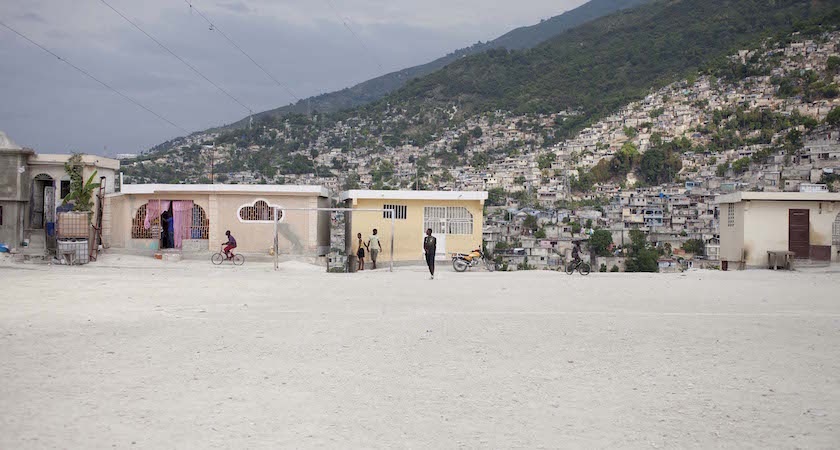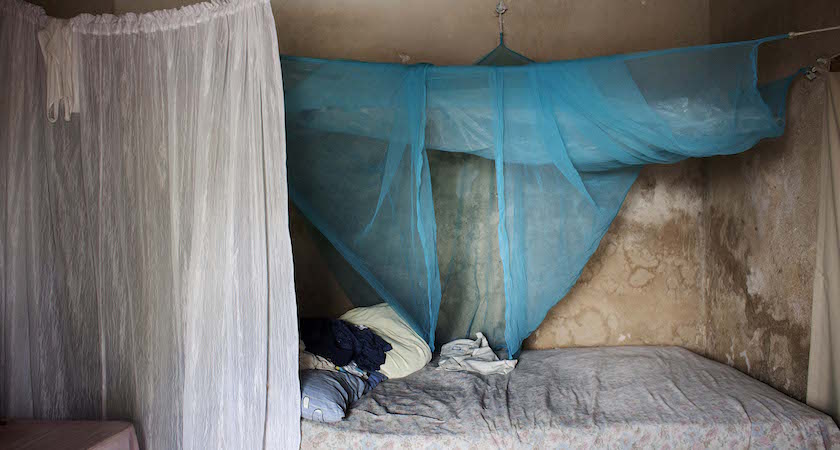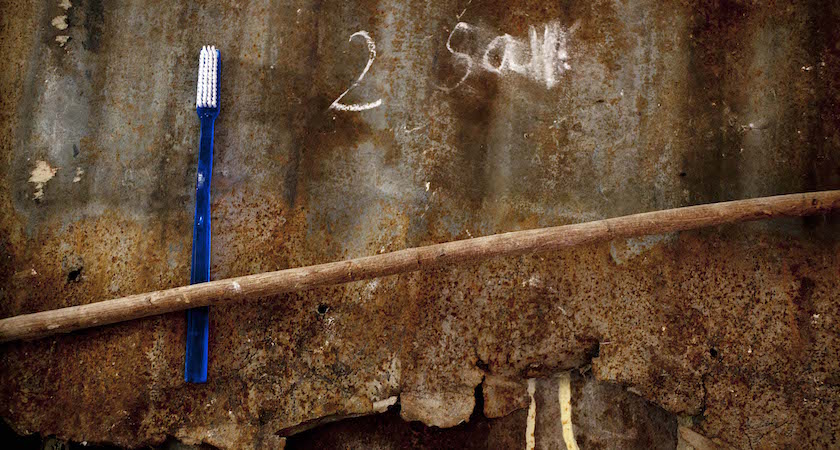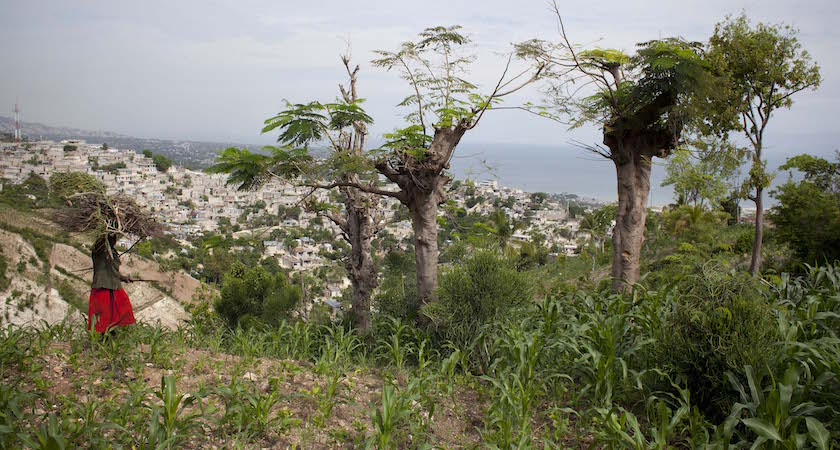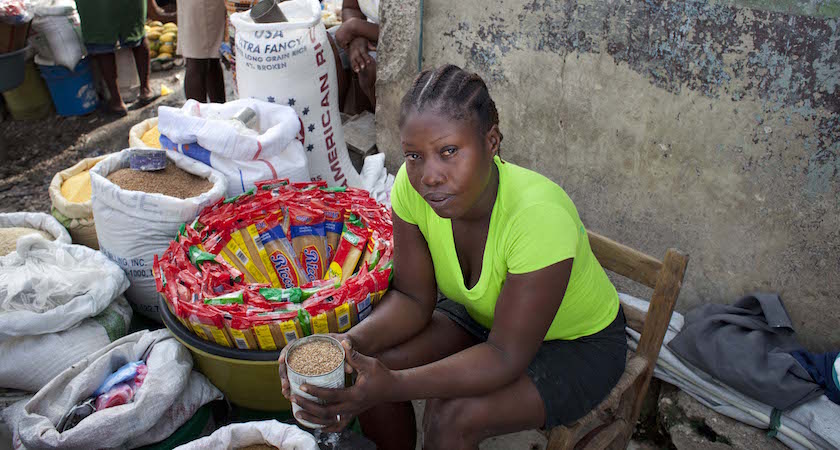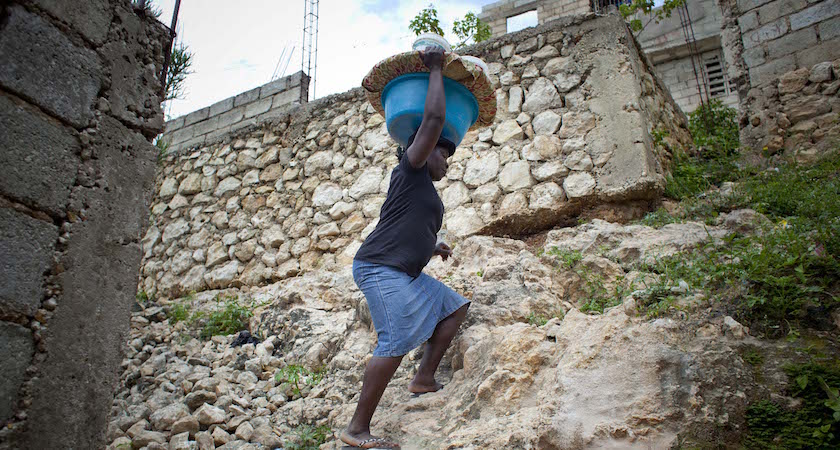IN THE aftermath of Hurricane Matthew, Haiti is once again fighting for survival in the face of its on-going struggle to rebuild after 2010’s devastating earthquake. Earlier this year Irish Post Editor-in-Chief SIOBHÁN BREATNACH visited the Caribbean nation with Irish charity Concern Worldwide. Here, she reports on what life is like for those living in one of the poorest countries in the world.
It was a Sunday evening in April when I arrived in Port-au-Prince, Haiti's capital city.
At 6.30pm the sun was just beginning to set as our plane descended towards the runway, a sprinkling of lights dotting the coastline, running along the hillside in a magical formation as if to whisper ‘welcome to the Caribbean’.
A quick customs check at arrivals and it was all aboard a Concern 4x4 bound for the city centre.
A bumper sticker on the dashboard emblazoned with the words ‘No arms on board’, gave an ominous clue as to what lay ahead - though it passed without remark from my more initiated travel companions – photographer Abbie Trayler-Smith and Concern senior communications officer Deborah Underdown.
The night air was warm but welcoming, and as we drove through election poster-lined streets the local nightlife was vibrant and alive – music and lights spilling from door to door as mopeds zipped through the traffic.
Bright neon signs demanded attention as we worked our way through the dusty streets, the need for a robust vehicle quickly becoming apparent as giant potholes and craters opened up beneath the wheels.
A man in a striking white shirt and dickie bow stood out from the crowd, as did the women in multi-coloured dresses walking by street stalls selling bottles of Guinness.
Arriving at our rooms in Pétionville, one of the more affluent areas of the capital where we were based during our stay, sleep offered a comforting arm as the last of the night’s music drifted softly by.
By 4.30am the following morning, the city began to stir to the sound of a cock crow.
A security briefing at Concern HQ was followed by a run-through of the charity's work in the country – construction, relocation, peace-building and special women’s projects.
According to Amnesty International, violence against women and girls is worryingly commonplace in Haiti. Convictions in cases of sexual violence against women remain low and the majority of domestic violence cases are not investigated or prosecuted.
In 2011 a bill to prevent and prosecute those who perpetrate violence against women was drafted, but due to the country’s dysfunctional parliament it has remained stalled.
According to Concern there is little humanitarian money to help in the fight against gender-based violence, with funds instead going towards construction and infrastructure projects.
Women are accepted at household level but violence is often used by men looking to control their families.
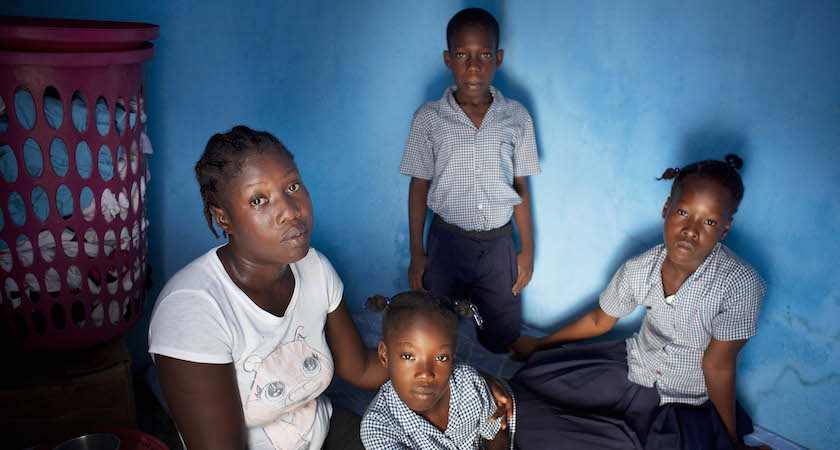 Thanks to a grant from Concern Wilmise Saintilma has her own business selling food in a market in Carrefour, Port au Prince. she is pictured here with three of her four children Sterlyn, 14, D'jouna, 11 and Fritna, 8. (Picture: Abbie Traylor-Smith)
Thanks to a grant from Concern Wilmise Saintilma has her own business selling food in a market in Carrefour, Port au Prince. she is pictured here with three of her four children Sterlyn, 14, D'jouna, 11 and Fritna, 8. (Picture: Abbie Traylor-Smith)According to the UN women’s organisation, disasters also kill more women than men, hit their livelihoods the hardest and cause spikes in violence during these deadliest of times.
In January 2010 a huge 7.0 magnitude earthquake struck Haiti, killing over 300,000 people and leaving a further 1.5million homeless.
Then, last month, Hurricane Matthew ripped through the country causing countless damage, leaving as many as 1,000 dead and over 1.4million people in need of immediate help over the next three months.
It is now hard to imagine how those I met earlier this year have once again found the strength to rebuild their lives.
During one of our first trips into the slums of Port-au-Prince we visited a school, where smiling, bright-eyed boys and girls – with colourful hair ties to match their uniforms - ran by in a flurry of excitement.
They were the lucky ones – in class, getting an education. Outside the school gates dozens more children of all ages - some playing with a battered ball, another running by with homemade kites fashioned from string and plastic bags – would never know the joy of learning to read and write.
Only half of children in Haiti will ever get the opportunity to go to school.
Of those that do, they will only attend lessons for eight years – half the time children in Britain and Ireland spend in education.
But for some a lost education is not the worst thing that can happen.
There was no clearer example of this than meeting a young wheelchair-bound girl - no more than nine or 10 - in a nearby camp.
Left paralysed when a stray bullet fired between warring gangs ricocheted and hit her neck, she will never walk again.
Driving through the streets of Haiti there is a daily curfew – we leave in the morning only once our scouts have given the all-clear and return before the sun sets for fear of our safety after dark.
The slum streets are dirty and squalid, rubbish piled high at almost every corner, yet there is a certain beauty that cuts through the bleakness.
The fantastically coloured tap tap buses – often carrying religious slogans or local artwork - serve as public taxis, while women - elegant and poised - grace the sidewalks perfectly balancing baskets filled with groceries on their heads.
Others sit on street corners selling rice and beans as basket weavers work alongside.
The streets of Haiti, though brutal, could be beautiful as the pink bougainvillea flowers that peak out in places seem to promise...some day.
Haiti is a country where gender-based violence and oppression is commonplace. But it is also a place where woman are striving to build a future for themselves and their families despite the constant threat of natural disaster and inequality within their society
It was the women I met that struck the greatest and most poignant chord – no more so than one mother, 35, and her 17-year-old daughter.
She spoke of how her child had been raped by her husband - the girl’s father - but how they have been the ones who have had to leave their community, accused of telling lies and causing trouble.
The mother is quiet as she tells her haunting story, how she now hopes to rebuild their lives away from her husband and his family.
Though protesting his innocence, he is on the run – the authorities seemingly not interested in finding him.
The woman sells baby clothes and food for a living but, having recently suffered from stomach problems, has been unable to make the trek to the roadside to sell her wares, which are now displayed on the small porch outside her home.
There is little passing trade.
As we talk, her daughter arrives home from school and joins the conversation. She tells us her dream is to be an air hostess.
I can’t help but hope she gets to fly away from the life she has had until now.
Another story comes by way of Christela Louis - a mother in the Grand Ravine area of Port-au-Prince. Considered to be living in extreme poverty, since June 2014 she has received community health and business training from Concern.
She is part of a management committee of women who now run a fully-funded bakery, in what was originally a funeral home - in the heart of the slum town.
There is a sweet triumph that a place once associated with death is now the focus of life and vitality.
The importance of being able to make bread for the community cannot be under-estimated in a country like Haiti, where some of the poorest people have and continue to eat cakes made of mud.
In recent years, headlines such as ‘Haiti: Mud cakes become staple diet as cost of food soars beyond a family’s reach’ have brought the dire problem of hunger to the fore.
Made from a mix of clay, water, oil and salt, the small pottery-like disks are sold cheaply from market stalls – eaten by those who cannot afford food but need to try keep hunger at bay, if only for a few hours.
Once eaten by impoverished calcium-starved pregnant woman, they are now often a last resort for poverty-stricken families desperate to stay alive in a country where infant mortality rates are around 48 per 1,000 – compared to 4.3 per 1,000 in Britain.
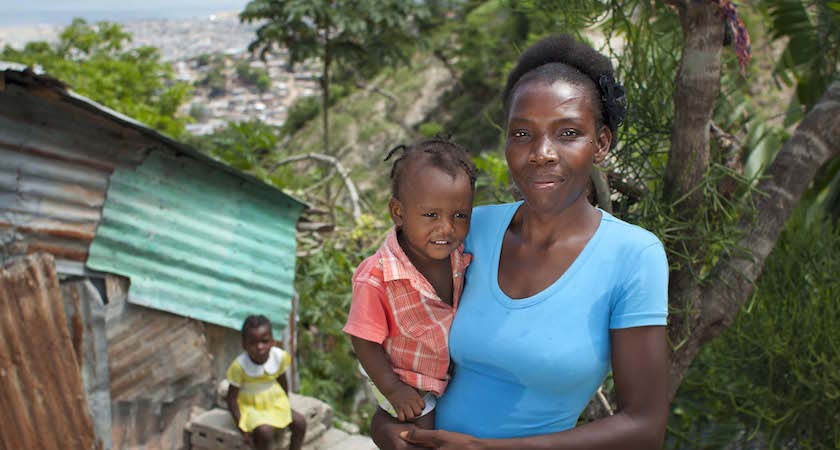 Christela Louis, how lives in Grand Ravine, is now working in the bakery with her one-year-old son Niderson and her five-year old daughter Jamesyca
Christela Louis, how lives in Grand Ravine, is now working in the bakery with her one-year-old son Niderson and her five-year old daughter JamesycaWhen we meet Christela she shows us around her hill-side home, a one-room concrete cube, with only the thinnest sheet of fabric hanging by a string to divide the room and give its occupants any sense of privacy.
The hike to the top, coupled with the day’s heat is enough to take its toll on even the most able-bodied – yet for Christela and her family, this is a journey that must be made numerous times a day, whether to fetch water, go to prayer or to work.
She and her husband – a wood-seller who earns less than 500 gourdes ($8) a week - have struggled to take care of their four children in the past.
“I am very often in the situation that I can’t feed my kids, and when their father can’t sell anything, we have nothing to give them,” she said.
But vaving recently finished a baking course and with the promise of work in the new Concern-supported bakery the future looked brighter.
Christela and her husband lost everything in the 2010 earthquake when their house completely collapsed. Her cousin, who had been living with her at the time, died.
She described it as a day like any other...until disaster struck. While taking care of her children, she went to get some water for a shower and the tremors started.
“No one understood what was happening,” she said. “They just saw everything shaking and at that moment the house collapsed. Others were crying and only then did I understand what was happening.”
The family were forced to live in a temporary tent in the aftermath but have now moved back into a more permanent home.
The bakery, she says, allows her to provide for her children but has also given her the gift of friendship. “Working with the other group of women, I now have friends to talk to about my problems,” she says.
As the poorest country in the Americas, according to the United Nations Human Development Index, Haiti has faced over two decades of political crisis and natural disasters that have decimated its people and its economy.
Attempts to elect a president have been delayed by over a year amidst allegations of fraud with the out-going president Michel Martelly leaving without an elected successor last October.
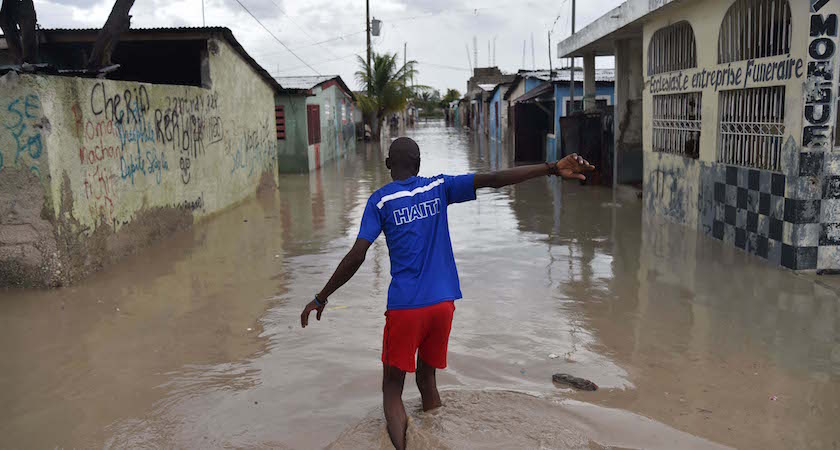 A man walks down a flooded street, in a neighbourhood of the commune of Cite Soleil, in the Haitian Capital Port-au-Prince (Picture: Hector Retamal/AFP/Getty Images)
A man walks down a flooded street, in a neighbourhood of the commune of Cite Soleil, in the Haitian Capital Port-au-Prince (Picture: Hector Retamal/AFP/Getty Images)The first round of elections finally went ahead a week ago - the official results are due this week - having been postponed to allow communities to recover from Hurricane Matthew, which Concern Worldwide says has left over 1.4million people in need of immediate help.
In Port-au-Prince, where to date there have been reports of over 510 cases of cholera, the waterborne disease could run to epidemic proportions, the aid agency has warned.
Just under a fifth of Haiti’s population, around 2.1million people, are believed to have been affected by the hurricane and it is feared the death toll could exceed 1,000.
Last month Concern Worldwide CEO Dominic MacSorley branded the world’s response to the natural disaster a disgrace, after it emerged just 20 per cent had so far been donated globally to help relief efforts.
The UN has since made a flash appeal for $120million.
“Despite the logistic challenges, this is a country that we have access to. There is no war, no bombs dropping and no excuses,” MacSorley said.
Praising efforts in Ireland and an Irish Government aid donation of €1.5million, he added: "It is a disgrace that there has not been a more robust response, particularly from the big major donors. The donors with the deepest pockets are failing Haiti and need to step up.
"Haiti suffers from a cycle of chaotic crisis response, there is now a need to invest seriously in building the resilience of poor communities to withstand disasters better.”
Concern Worldwide has worked in Haiti since 1994 and currently has a team of 130 on the ground, led by Country Director Nellie Kingston from Clonakilty, Co. Cork.
When I visited in April, as part of Concern Worldwide's Build Hope in the City appeal, the ground was dry and the sun shone bright.
While many of those I met expressed their hope for the future, the loss and ruin caused by the earthquake in 2010, coupled by yet another hurricane (Sandy) in 2012, was clear to see.
The Irish charity works to provide water, sanitation, employment and education in the island nation’s impoverished communities.
Despite being a Caribbean country rich in culture and beauty, Haiti does not enjoy the free-flowing benefits of a healthy tourist trade like that of its neighbours in the Dominican Republic, Cuba and Jamaica.
The average life expectancy of a person in Haiti is just 63.8 years, during which time almost 60 per cent of people will live in poverty - close to a quarter of those in extreme poverty.
Half the population is also undernourished, according to The State of Food Insecurity in the World 2015 report.
The Grand Ravine area of Port-au-Prince typified many of the slums of Haiti that have become home to thousands and thousands of people.
Browbeaten by gang rivalries and poor infrastructure, the area has been a hive for crime and violence.
Last year there were 1,071 reported murders in Haiti, with 70 per cent in Port-au-Prince, according to the United States’ Overseas Security Advisory Council.
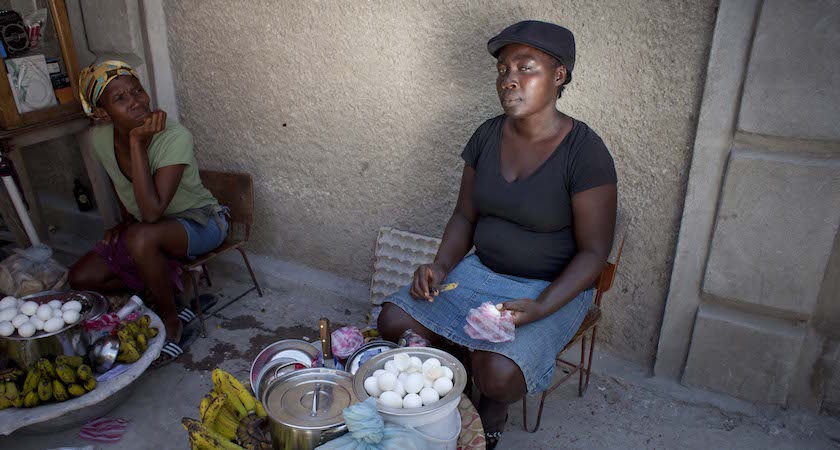 Street trader Suzanne Vil, who receives financial help form Concern, at work. (Picture: Abbie Trayler-Smith)
Street trader Suzanne Vil, who receives financial help form Concern, at work. (Picture: Abbie Trayler-Smith)Just three years ago going to the Grand Ravine slum would have been too dangerous, but work between the charity and community leaders has helped ease tensions allowing for organised visits – though only in escorted daylight hours.
On our arrival however, local gang leaders were not deterred from quietly making their presence known, slinking by while offering a glimpse of a gun before disappearing just as quickly as they had arrived.
Walking through the market area there is a faint hum from the flies swarming around the food and wares on offer.
Older women grill corn as rows of raw meat and fish are lined up in the searing heat next to mangos, coconut, limes, onions, rice, tinned goods and more.
Groups of children run by – some with curious giggles, others more weary of the strangers in town.
Slum dwellings in Haiti are often built with no foundations, adhering to little or no construction regulations, while sanitation is non-existent.
In recent years Concern has worked to strengthen existing drainage channels, which has helped cut the risk of sewage contaminating drinking water – protecting residents from disease.
It’s only when I’m told to look out for ‘flying toilets’ - which I later learn is what happens when people with no access to a proper toilet are forced to fill and tie plastic bags that are then thrown as far away as possible – that it truly begins to dawn on me what life is like in Grand Ravine.
Building sustainability and creating an agenda of accountability in the hope that it will pay off for the community is what Concern says it is trying to achieve through its projects in Haiti.
To demonstrate this, we were introduced to Rogeny Jean-Baptiste.
He lives in the partially rebuilt remains of his family home where he’s lived since he was born in 1982.
There is Haitian music playing on a small battery-operated radio on the wall outside when we meet.
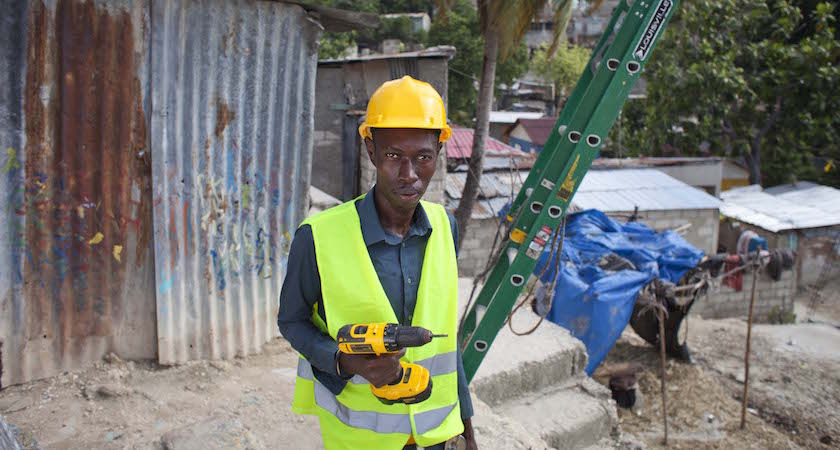 Rogeny Jean-Baptiste, a Concern trained solar light engineer, prepares to check a light in Grand Ravine. (Picture: Abbie Trayler-Smith)
Rogeny Jean-Baptiste, a Concern trained solar light engineer, prepares to check a light in Grand Ravine. (Picture: Abbie Trayler-Smith)In 2014, and as part of a Concern project, Rogeny trained and became an electrician tasked with the installation and maintenance of around 128 streetlights in Grand Ravine.
“The situation is better now than in the past,” he says. “There are more activities now at night, people can trade around the street lights, people can go out on their bicycles. Before, by seven people would be inside.”
But the lights offer more than just a chance to stay out late.
“Before people would use the darkness to rape the girls and to steal people’s things,” Rogeny adds. “Now, because of the streetlights, this has considerably dropped.
"So now if someone has the intention to rape someone, now there is light everywhere, it has reduced the rape cases.”
Rogeny is also an artist and showed me one of the landscapes he had painted – its vivid colours contrasting sharply with the grey concrete blocks of his home that lies open to the elements in places – a constant reminder of the 2010 earthquake.
“A lot of people died around me, houses collapsed, my best friend died that day at the university,” he recalls. “I am more than afraid it will happen again.”
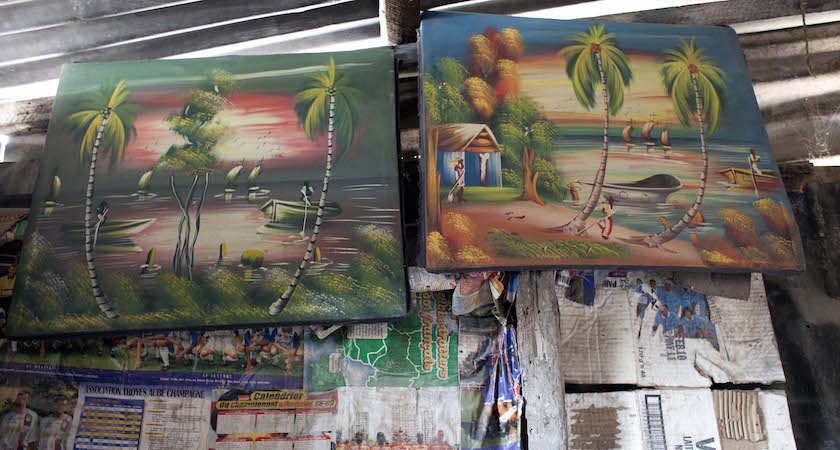 Inside Rogeny Jean-Baptiste's home in Grand Ravine. Rogeny is also a keen painter. (Picture: Abbie Trayler-Smith)
Inside Rogeny Jean-Baptiste's home in Grand Ravine. Rogeny is also a keen painter. (Picture: Abbie Trayler-Smith)Lucknord Dorvilson is our community guide and has been a facilitator for Concern’s Urban Redevelopment programme in Grand Ravine since September 2013.
A child of the slums, he says he has chosen to stay away from the gangs, instead wanting to help his community to change for the better.
He talked passionately about the projects he has seen.
“Before when it was raining people where unable to get into the community, so a bridge was built that helped people come from one part to the other to get to their houses,” he says.
“We have also been working with people, giving them seeds and agriculture, so now there are some beautiful gardens.”
He remembers the earthquake in great detail.
“All the houses were collapsed...it was very difficult,” he says. “We had no food, nowhere to sleep, everyone was sleeping outside because they were too scared to be inside. Nobody came just after the earthquake, it was just us.”
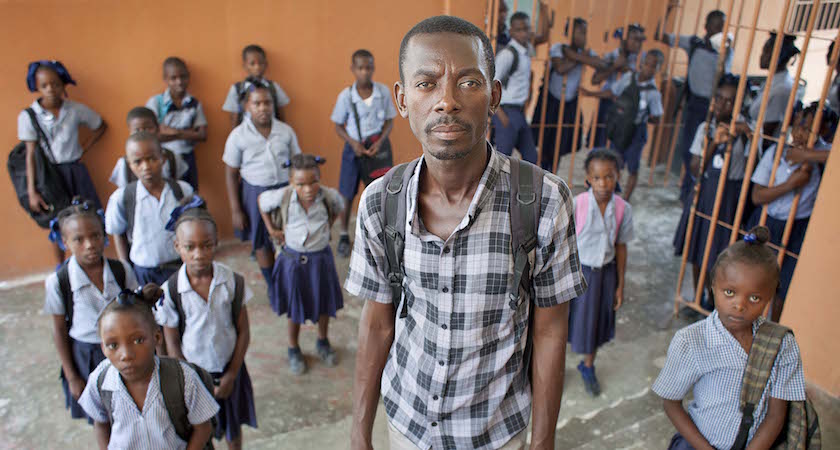 Lucknord Dorvilson, Community Facilitator, in a school in Grand Ravine where he helped to ensure new hand washing and toilets were installed. (Picture: Abbie Trayler-Smith)
Lucknord Dorvilson, Community Facilitator, in a school in Grand Ravine where he helped to ensure new hand washing and toilets were installed. (Picture: Abbie Trayler-Smith)The Caribbean island of Hispanolia was first discovered by Christopher Columbus in 1492, leading to the arrival of Spanish, and afterwards French, settlers who wiped out the native Taino population.
The Spanish later conceded a third of the island to the French, which became Haiti, where today Creole and French are the official languages.
The sugar industry and an abundance of forestry – fuelled by the slavery trade from Africa - once meant the country was one of the wealthiest in the Caribbean.
A revolt, followed by a declaration of independence, saw Haiti become the first post-colonial black-led nation in the world in 1804.
But today, unemployment is high leading to continued poverty and insecurity in the country, not helped by a deluge of natural disasters such as the recent Hurricane Matthew.
While I've yet to learn the fate of Lucknord and Rogeny since the hurricane in April, there was news of Christela.
She has been working at the bakery but Hurricane Matthew's raging storms had sadly taken the lives of her two cousins and an aunt in the Nippes province.
“Many people were afraid, there was a lot of wind and rain. I live at the top of Grand Ravine, so the water just rushed down the hill. But only the banana trees fell down, ” she said, thanks in part to the work Concern has been doing to build drainage canals, retain walls and gabion walls for erosion protection.
“Before the construction, when it rained there was a lot of flooding... but after, there was none,” Christela added. “I am happy, now I am working. Before I was getting by, but now, I am hoping to grow a business.
“I have had to spend all the money on the family and on the children,” she added. “If I continue on the path that I am on, we will be fine.”
Our week in Haiti also took us to Carrefour, a bedroom community (residential commuter area) for Port-au- Prince, which is home to around 400,000 people, including Vil Suzanne.
A mother of four girls aged 16-22, she owns a house in the area which she shares with all her daughters and a grandson.
Having been referred by Concern’s protection team, she now runs an egg-selling business having received around 5,000 Haitian Gourde (around $100) from Concern.
In the morning she sells boiled eggs, peanut butter and bananas in the streets and at night she makes and sells take-away egg sandwiches in her neighbourhood.
Her home, still unfinished since being destroyed by the earthquake, comprises of two small darkened rooms.
There is no bathroom or running water, with only slivers of natural light creeping through the corrugated iron clad windows and door to illuminate her home.
One of the younger girls is braiding another’s hair, fingers moving perfectly in sync with our conversation.
Suzanne’s four-month-old grandson Wood Marley - 18-year-old daughter Christela’s son - gurgling happily on a blanket on the floor.
Later, while waiting in the back room for our photographer to take the family’s portrait, I see a pair of cockroaches scuttle across the wall, followed by the scurry of a rat in the corner.
It brings the reality of why we are here firmly to bear.
Aged 42, Suzanne’s day starts at 2.30 in the morning when she boils eggs in preparation for her day.
At 5am she leaves the house to go to the market - around a mile away - before making the return trek at noon to prepare food for her children and take a much-needed one-hour nap.
She leaves again at 6pm to sell her sandwiches until 9.30 at night – though admits it is the morning’s boiled eggs that always sell better.
“It’s a long day,” she admits. “And if I had a choice I would choose something else, because I am capable of doing it.”
She says she was never given the chance to go to school.
Having grown up in the rural town of Jacmel, in the south east of Haiti, she was sent to Port-au-Prince at the age of 12 to live with her uncle when her parents couldn’t afford to keep her any longer.
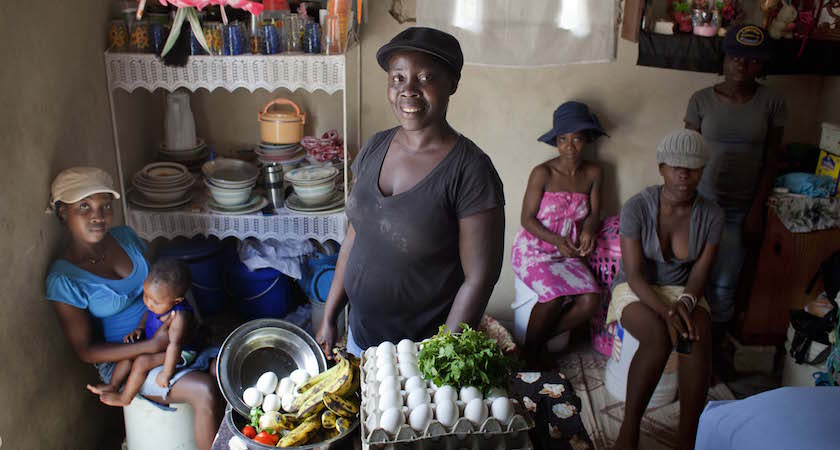 Suzanne with her daughters Christela, 18 with her four-month-old son, Nancy, 22, Shedna, 16 and Miralda, 17. (Picture: Abbie Trayler-Smith)
Suzanne with her daughters Christela, 18 with her four-month-old son, Nancy, 22, Shedna, 16 and Miralda, 17. (Picture: Abbie Trayler-Smith)Today, she has no support from her husband. “I have a husband but he used to cheat on me and so I left him and now I’m alone with the children,” she said.
There have been days when Suzanne has not been able to feed her children “they would go to school hungry” – though those days are now fewer thanks to her egg business.
Like any mother she has hopes and aspirations for her daughters – things we might often take for granted.
“I would like them to finish school, learn a profession and work,” she says.
As for her own dreams, she is quick to say that they have not been realised in this life.
“I wanted to be a business woman, not selling eggs on the street but having a big store and not having to sit on the street and sell.
“I wanted something bigger,” she adds, just as baby Marley lets out a wail.
It’s as if he too knows they deserve a life better than this.

